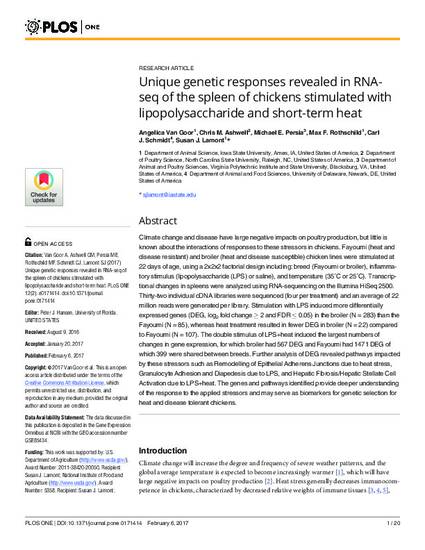
Climate change and disease have large negative impacts on poultry production, but little is known about the interactions of responses to these stressors in chickens. Fayoumi (heat and disease resistant) and broiler (heat and disease susceptible) chicken lines were stimulated at 22 days of age, using a 2x2x2 factorial design including: breed (Fayoumi or broiler), inflammatory stimulus (lipopolysaccharide (LPS) or saline), and temperature (35°C or 25°C). Transcriptional changes in spleens were analyzed using RNA-sequencing on the Illumina HiSeq 2500. Thirty-two individual cDNA libraries were sequenced (four per treatment) and an average of 22 million reads were generated per library. Stimulation with LPS induced more differentially expressed genes (DEG, log2 fold change ≥ 2 and FDR ≤ 0.05) in the broiler (N = 283) than the Fayoumi (N = 85), whereas heat treatment resulted in fewer DEG in broiler (N = 22) compared to Fayoumi (N = 107). The double stimulus of LPS+heat induced the largest numbers of changes in gene expression, for which broiler had 567 DEG and Fayoumi had 1471 DEG of which 399 were shared between breeds. Further analysis of DEG revealed pathways impacted by these stressors such as Remodelling of Epithelial Adherens Junctions due to heat stress, Granulocyte Adhesion and Diapedesis due to LPS, and Hepatic Fibrosis/Hepatic Stellate Cell Activation due to LPS+heat. The genes and pathways identified provide deeper understanding of the response to the applied stressors and may serve as biomarkers for genetic selection for heat and disease tolerant chickens.
Available at: http://works.bepress.com/max-rothschild/164/

This article is published as Van Goor, Angelica, Chris M. Ashwell, Michael E. Persia, Max F. Rothschild, Carl J. Schmidt, and Susan J. Lamont. "Unique genetic responses revealed in RNA-seq of the spleen of chickens stimulated with lipopolysaccharide and short-term heat." PloS one 12, no. 2 (2017): e0171414. doi: 10.1371/journal.pone.0171414. Posted with permission.